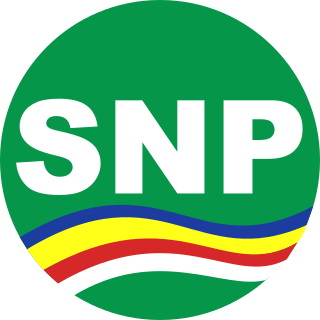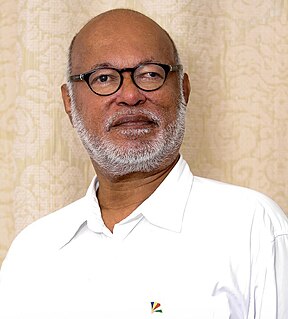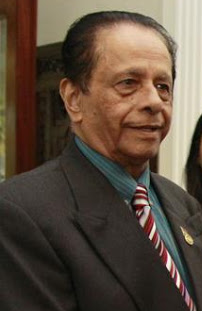
The politics of Seychelles have historical roots in both one-party socialism and autocratic rule. Following independence from the United Kingdom in 1976, Seychelles was a sovereign republic until 1977, when the original President and leader of the Seychelles Democratic Party, James Mancham, was overthrown in a bloodless coup by the Prime Minister France-Albert René. René installed a single-party socialist state under the Seychelles People's Progressive Front which remained in place until 1993, when multiparty elections took place for the first time since independence. Modern day Seychelles governance takes place in a framework of a presidential republic, whereby the President of Seychelles is both head of state and head of government, and of a multi-party system. Executive power is exercised by the government. Legislative power is vested in both the government and the National Assembly.

France-Albert René was a Seychellois politician who served as the second President of Seychelles from 1977 to 2004. He was nicknamed by Seychellois government officials and fellow party members as "the Boss". His name is often given as simply Albert René or F.A. René; he was also nicknamed Ti France.

James Alix Michel, GCSK is a Seychellois politician who was President of Seychelles from 2004 to 2016. He previously served as Vice-President under his predecessor, France-Albert René, from 1996 to 2004. Michel was initially a teacher, but later he became involved in the archipelago's booming tourism industry and joined René's political party before independence in 1976.

The Seychelles National Party(SNP) is a liberal political party in Seychelles. Its followers emphasize active multiparty democracy, respect for human rights and liberal economic reforms. It was founded in response to what it called the "totalitarian regime" of former President France-Albert René. It publishes a newsletter called Regar, which is frequently sued for libel by government officials. On Regar's front page of every issue is a quote from the constitution of Seychelles invoking their right to freedom of speech and freedom of expression.

The Congress for Democracy and Progress was the ruling political party in Burkina Faso until the overthrow of Blaise Compaoré in the year 2014.

Wavel Ramkalawan is a politician of the Seychelles.

Roch Marc Christian Kaboré is a Burkinabé politician and banker and the President of Burkina Faso, in office since 2015. Previously he served as the Prime Minister of Burkina Faso between 1994 and 1996 and President of the National Assembly of Burkina Faso from 2002 to 2012. He also served as President of the Congress for Democracy and Progress (CDP). In January 2014, he left the ruling CDP and joined a new opposition party, the People's Movement for Progress.

Presidential elections were held in the Seychelles between 28 and 30 July 2006. Incumbent president James Michel of the Seychelles People's Progressive Front was re-elected with 54% of the vote.
Joseph Belmont is a Seychellois politician who was the Vice President of the Seychelles from 14 July 2004 until his retirement on 30 June 2010. He took office after President France-Albert René stepped down and the previous Vice-President, James Michel, replaced René as President. Belmont is one of the leading members of the Seychelles People’s Progressive Front (SPPF).

Patrick Georges Pillay is a Seychellois politician who was the Speaker of the National Assembly of the Seychelles from 2016 to 2018. Previously he served as Minister of External Affairs and Minister of Health. In 2010, he was appointed resident High Commissioner to the United Kingdom.
Articles related to Seychelles include:

Arab navigators and other sailors doubtless knew of Seychelles for many centuries. However, the recorded history of Seychelles dates back to the fourth of the Portuguese India Armadas led by Vasco da Gama. On 15 March 1503, the scrivener Thomé Lopes noted the sighting of an elevated island, doubtless one the granitic islands and almost certainly Silhouette Island. The first recorded landing was by the men of the English East India Company ship Ascension, which arrived in Seychelles in January 1609. The islands were claimed by France in 1756. Seychelles remained uninhabited until the first settlers arrived on board the ship Thélemaque, which arrived on 27 August 1770. Captain Leblanc Lecore landed the first colonists, comprising 15 white men, eight Africans and five Indians. The Seychellois Creole language developed as a means of communication between the different races. The British frigate Orpheus commanded by Captain Henry Newcome arrived at Mahé on 16 May 1794. Terms of capitulation were drawn up and the next day Seychelles was surrendered to Britain. Following the fall of Mauritius to British forces, Captain Phillip Beaver of the Nisus arrived at Mahé on 23 April 1811 and took possession of Seychelles as a permanent colony of Britain. The Seychelles became an independent republic in 1976. Following a coup d'état, a socialist one-party state ruled the country from 1977 to 1993. The subsequent democratic Presidential elections were won by candidates of the same party.

General elections were held in the Seychelles between 20 and 22 March 1998. Incumbent President France-Albert René and his Seychelles People's Progressive Front won both elections with over 60% of the vote, defeating a divided opposition.

The Seychelles People’s Progressive Front is a political party in Seychelles. It has existed since 1977.

Presidential elections were held in the Seychelles between 19 and 21 May 2011, commencing on the Outer Islands on 19 May, with Inner Islands voting on 20 May and Mahé on 21 May. The result was a victory for incumbent President James Michel of the Seychelles People's Progressive Front, who received 55% of the vote in the first round.

A parliamentary election was held in Seychelles from 29 September to 1 October 2011. The election was boycotted by all the main opposition parties. As a result, the People's Party won all 31 seats in the National Assembly.

General elections were held in Mauritius on 10 December 2014 and resulted in a landslide victory for the Alliance Lepep coalition, which secured 47 of the elected seats under the leadership of Sir Anerood Jugnauth, while the PTR–MMM alliance under Navin Ramgoolam only got 13 seats.

Dr Jean Désiré MaximeFerrari, KSS, OBE [French pronunciation: [dʒin deziʁe mæksim ferˈraːri]] is a retired politician and former obstetrician who held several different positions in the government of the Seychelles. He is widely regarded as an activist against corrupt governmental practices and a champion of human rights and democracy in the African island nations of the Indian Ocean.
Rita Sinon was a Kenya-born Seychellois politician who became the first female Minister of Seychelles was when she was appointed Minister for Internal Affairs on 19 September 1986.














